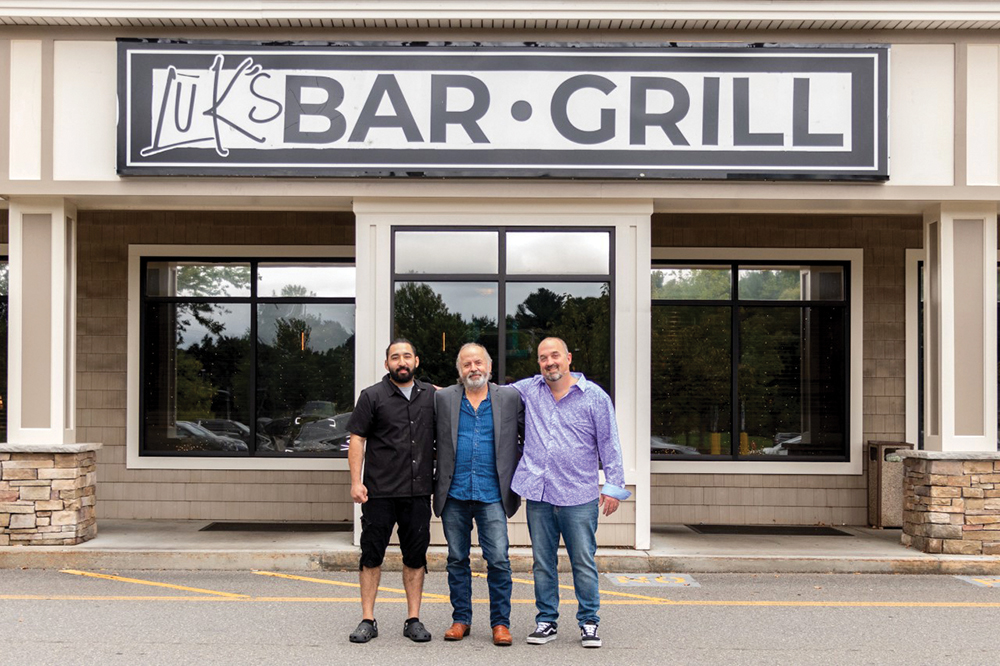
Twin Bridges connecting Nashua and Hudson. Courtesy of Brian Groth.
Hudson’s mix of prime location, stable tax rate, business diversity and pastoral charm continues to make it a major economic powerhouse for southern NH. Hudson properties are in such high demand that realtor.com last year named the town’s zip code as the seventh hottest market in the United States.
“The growth rate for Boston and the Boston metro area, of which Hudson is a part, has significantly exceeded the national rate of growth,” says Jay Minkarah, executive director of the Nashua Regional Planning Commission. “Being part of one of the more vibrant economies nationally is certainly to the benefit of Hudson.”
The town of 25,000 rests on the border of Massachusetts, giving it ready access to the metro Boston market. Across the Merrimack River is NH’s second-largest city, Nashua, which continues to offer jobs and opportunities much as it did when Hudson residents took ferries across the river to work in the mills decades ago. Its proximity to more modern transportation is also a draw as Manchester-Boston Regional Airport is some 20 minutes away, and Boston’s Logan Airport is less than an hour to the south.
But Hudson also hosts two industrial parks, both with economic revitalization zones, and its own array of employers, ranging from electronics firms like BAE Systems and Mercury Systems to metal manufacturer APW Enclosures to the small businesses and retailers lining Routes 102, 3A and 111.
“The cost of doing business here is stable and affordable, and the location is great,” says Town Planner Brian Groth.
Mass. Effect
Residents now use twin bridges to cross the river between Hudson and Nashua, and two major interstates, the Everett Turnpike/Route 3 and I-93, give easy access to both Massachusetts and NH commercial centers.
That proximity is what prompted the founders of Integra Biosciences, a global company, to locate its North America headquarters in Hudson some 16 years ago, according to Robert Fougere, U.S. site manager and CFO, and why the company recently purchased a second building nearby.
“Being so close to Massachusetts yet being in New Hampshire with all the things that New Hampshire has to offer from an environmental standpoint and a financial standpoint,” tilted the scale to locating in Hudson, he says. A manufacturer of products for the life sciences industry, Integra started in a 20,000-square-foot building on Wentworth Drive and now has an additional property on nearby Friars Drive.
“Back in 2012, we might have had 20 employees,” Fougere says. “This year, we’re just under 400 employees, and we’ve gone from one shift five days a week to three shifts seven days; [we]went from 20,000 to 35,000 square feet, and purchased another building in the same industrial park, which added about 32,000 square feet.”
Fougere praised the town’s planning department for its help in facilitating the expansion. “We had a very aggressive plan to increase the footprint of the facility, and we immediately reached out to the town,” he recalls. “They worked very closely with us, communicated every day, and we were able, in record time, to put up a quality facility and meet all the requirements in about nine months.”
Logistics Center Battle
Hudson’s prime location also makes it an ideal spot for a distribution center—an increasingly sought-after footprint in an era of increased online buying—and the planning board has conditionally approved one such proposal, which has since faced vocal opposition from abutters and other residents.
Voters at town meeting in 2017 approved a zoning amendment to increase building height to 50 feet to accommodate high-bay warehouses as a way to attract businesses such as a distribution center.
Real estate development firm Hillwood Enterprises has proposed a Hudson Logistics Center that would include three buildings totaling 2.6 million square feet, displacing what is currently the Green Meadow Golf Club next to the Sagamore Bridge. Two of the buildings would be Amazon centers, according to Groth, and the development would generate $4.25 million in annual tax revenue as well as 1,400 jobs.

A rendering of the proposed Hudson Logistics Center. Courtesy photo.
But opponents have expressed concern about traffic. A grass roots coalition called Save Hudson NH has set up a website and started a petition drive and a GoFundMe campaign to fight the project. Opponents have also filed appeals in Hillsborough County Superior Court, where the matter now rests.

Save Hudson NH website
Challengers also object to the proposed development eating up 372 acres of green space in a town where buildable land is becoming scarce. Hudson has a rich history of agriculture, and farmland once dominated the landscape. But with improvements to the bridges across the Merrimack River, “all of a sudden those farmlands became very viable for business and industry,” says Groth. “Sagamore [Industrial] Park was planned in the ’60s, and you can see the transition from farmland to industrial park.” The park now supports an estimated 2,700 jobs.
Adjacent to Sagamore Industrial Park, a workforce housing development, totaling 84 units is now under construction. Known as Friar’s Court, the phased project includes two buildings, each with a mix of one- and two-bedroom units.
Attracting Businesses
There are many reasons Hudson has become a magnet for businesses and residents, including boasting one of the state’s lowest tax rates at $21.37 per $1,000 valuation, according to Town Administrator Steve Malizia, and town-owned water and sewer services with rates that have not increased for a decade.
Its two major industrial parks, Sagamore and Clement Road, include economic revitalization zones, which allow companies that move into unused or underutilized industrial parks to apply for state tax credits against their annual business profits or enterprise taxes. Integra Biosciences is in the Sagamore Industrial Park, and Fougere says those tax credits figured into the company’s decision to locate and grow in Hudson.
Besides the industrial parks, other industrial centers include the Continental Paving area on Route 102, Brox Industries on Greeley Street and the BAE compound near the Massachusetts border.
That diversity of business and industry is another of Hudson’s economic strengths, says Minkarah of the Nashua Regional Planning Commission. “There is high-tech, as well as a number of small and mid-sized manufacturers and a number of contractor businesses that are doing rather well lately,” he notes.
Hudson offers other amenities, including recreational areas like Robinson Pond and Otternic (often called Tonic) Pond and a wild bird sanctuary in the southern part of town called Musquash Pond. The 166-acre Benson Park, which was once the site of Benson’s Wild Animal Farm, now includes walking and biking trails, as well as ponds, picnic areas, a dog park and a playground. The town is home to the Whip-Poor-Will Golf Club on Route 102.

Benson Park, the former site of Benson’s Wild Animal Farm. Courtesy of Brian Groth.
For many, it remains a bedroom community. Some 36% of Hudson residents commute to Massachusetts, and 19% commute to jobs in Nashua. Minkarah says those links to the economies of southern NH and the Boston metro area “are strengths for Hudson, both for businesses that choose to locate in Hudson and for residents, because it gives them a broader range of employment opportunities, including jobs that are quite high-paying.”
Another economic asset is community support for local businesses and vice versa, according to Brenda Collins, executive director of the Greater Hudson Chamber of Commerce. She points to Luk’s Bar and Grill, which provided free lunches to school-age children at the height of the COVID pandemic. “In turn, people supported them,” she says.

From left: Justin Hoang, David Raptis and Jason Fiore Sr., owners of Luk’s Bar and Grill. Courtesy photo.
Challenges
But the town still faces several economic challenges, and chief among them is a lack of available workforce.
Collins says restaurants have been especially hard hit by staffing shortages, with some reducing hours or closing on some days. Kendall Pond Pizza recently closed its doors for a couple of months due to the lack of workers, she says.
That workforce shortage goes hand-in-hand with a lack of affordable housing. “We need to attract more people interested in living and working in communities like Hudson and in the region generally,” says Minkarah. “A key barrier to attracting more workers to the area is a lack of housing. Our vacancy rates are incredibly low.”
Groth notes that 290 people have submitted applications for the 84 housing units under construction at Friar’s Court, “which gives you a sense of the demand.”
Increasing traffic volume is another complaint town officials hear. “A lot of people from Windham and Pelham go through Hudson going to work,” says Malizia, the town administrator and a resident for 35 years.
Groth agrees that “traffic has multiplied greatly in the past few decades.” There is a road widening project at the bridge, but Groth is wary of widening other corridors because “it just invites more traffic.”
Hudson also faces some environmental challenges. The Johns-Manville Corporation in Nashua produced asbestos-containing building materials for decades in the 1900s and offered the material to area property owners free of charge as “clean fill.” Consequently, many properties in both Hudson and Nashua are filled with asbestos waste.
One such site in Hudson is Merrill Park, a town-owned property on the river, which the town is seeking to remediate, according to Groth. There are no plans as yet to address the issue town-wide, he says.
But Malizia says the overall quality of life in Hudson still makes it a desirable place to live and work. “I think we’re positioned strongly,” he says.
Adds Groth, “I think the unique thing about Hudson, relative to other towns you might consider bedroom communities, is we’re very well balanced in terms of land usage, housing types, business types, and that all adds up to stable finances.”

 Current Issue - April 2024
Current Issue - April 2024